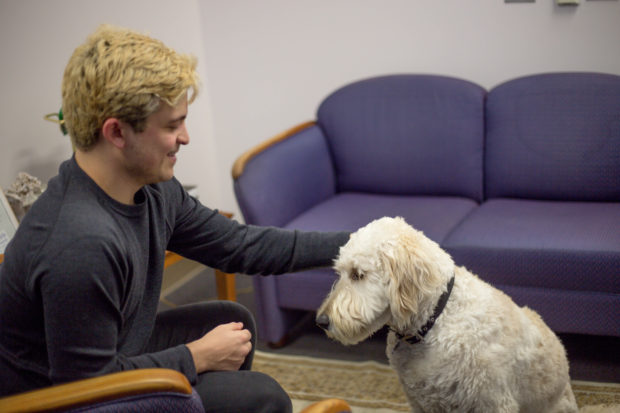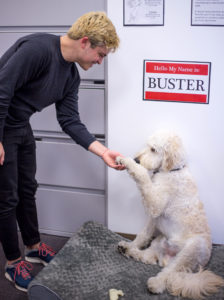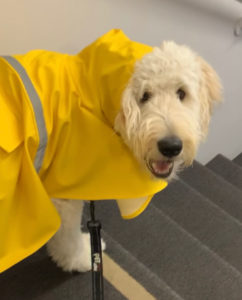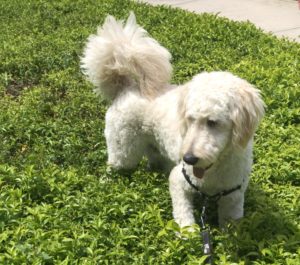
Buster, a 65-pound, one-year golden doodle has quickly become a favorite furry face on the LMU campus this past year. Whether Buster is out making appearances at on-campus events, taking walks on the bluff or working in the Student Psychological Services (SPS) offices, he is having a powerful impact on the Lion community.
While many see Buster around campus, not everyone knows his primary role is as a pet therapy dog in the SPS office. In February, Buster started working full-time in the SPS office from 8 a.m. to 5 p.m. Buster is there as students come into the office for appointments and he has several students who volunteer to take him on walks throughout the day.
 When he’s not working or making public appearances on campus, he resides on-campus with Fr. Eddie Siebert, S.J. Fr. Siebert initially presented the idea of having a pet therapy dog on campus to the Division of Student Affairs and SPS as an option to help support students in their college journey. Kristin Linden, , director of SPS says, “This would not have been possible without the support of Lane Bove, Ed.D., senior vice president for Student Affairs, who pushed this through and allowed us to bring Buster to the office.”
When he’s not working or making public appearances on campus, he resides on-campus with Fr. Eddie Siebert, S.J. Fr. Siebert initially presented the idea of having a pet therapy dog on campus to the Division of Student Affairs and SPS as an option to help support students in their college journey. Kristin Linden, , director of SPS says, “This would not have been possible without the support of Lane Bove, Ed.D., senior vice president for Student Affairs, who pushed this through and allowed us to bring Buster to the office.”
According to the Alliance of Therapy Dogs, there are many benefits to having therapy dogs on college campuses and in the counseling office setting including:
- Physical benefits: reducing blood pressure
- Social benefits: promotes greater self-esteem and focused interaction with other students, faculty and staff
- Cognitive benefits: therapy dogs can stimulate memory and problem-solving skills.
- Emotional and mental health benefits: therapy dogs can lift moods in the classroom, often provoking laughter, offer friendship and be a shoulder to lean on for students
The SPS office noticed these benefits and a shift in the mood of students as they enter the office. “Many students used to come in with serious expressions on their faces and now with Buster in the office, everyone comes in smiling,” said Linden. “Students are excited to see him in the office. They come in to lay with Buster on his bed to cuddle or be close to him. He has a sweet temperament and will come to over to them or follow commands.”
 Some of the best witnesses to the impact Buster is having on the bluff are the students who volunteer to walk him and witness first-hand the reactions he brings from students, staff and faculty alike. Kendall Mata ’21 started walking Buster at the beginning of the Spring 2019 semester. “I walk him three times a week, and he is such a bright spot in my day,” said Mata. “Sometimes when I go on walks with him, I run into the campus tours and the tour guides always weave him into their spiel about SPS.”
Some of the best witnesses to the impact Buster is having on the bluff are the students who volunteer to walk him and witness first-hand the reactions he brings from students, staff and faculty alike. Kendall Mata ’21 started walking Buster at the beginning of the Spring 2019 semester. “I walk him three times a week, and he is such a bright spot in my day,” said Mata. “Sometimes when I go on walks with him, I run into the campus tours and the tour guides always weave him into their spiel about SPS.”
“Everyone on campus knows him from students to staff to the facilities management team, and they all love him. People are always impressed with him even more so when I tell them that he is still a puppy and in training.”
— Kendall Mata ’21
 Annie Heinen ’22 also started walking Buster at the beginning of the Spring 2019 semester on Tuesdays and Thursdays. For Heinen, this was not her first experience with having a therapy dog at school. “I had therapy dogs at my high school and seeing them always made my day, so when I found out that LMU was training a therapy dog I naturally was incredibly excited,” said Heinen.
Annie Heinen ’22 also started walking Buster at the beginning of the Spring 2019 semester on Tuesdays and Thursdays. For Heinen, this was not her first experience with having a therapy dog at school. “I had therapy dogs at my high school and seeing them always made my day, so when I found out that LMU was training a therapy dog I naturally was incredibly excited,” said Heinen.
“I have grown very attached to Buster to the point where walking him is the highlight of my week. Even though Buster still has the energy of a puppy, he is incredibly important to the school community because his presence can automatically make someone’s day bright.”
— Annie Heinen ’22
 For Juliana Hogue ’21 taking Buster on walks has been a way to understand why he is so important to the campus community. “Buster gives them a moment to breathe and no matter what they have to do or how complicated their lives are, at that moment all that matters is this gentle giant,” said Hogue.
For Juliana Hogue ’21 taking Buster on walks has been a way to understand why he is so important to the campus community. “Buster gives them a moment to breathe and no matter what they have to do or how complicated their lives are, at that moment all that matters is this gentle giant,” said Hogue.
“I genuinely cannot begin to count how many times students have looked up at me while they pet Buster and said something along the lines of I really needed this today, or I miss my dog so much, and sometimes even I was feeling so homesick, I’m so glad I saw you. It happens at the very least once a week.”
— Juliana Hogue ’21
 Hogue knows that when she takes Buster on a walk on campus, she’s going to be stopping to talk to people and will get to hear about their experiences with Buster or even about their animals at home. “I get to witness the joy he brings to everyone around I get to meet new people and sometimes hear their stories,” said Hogue. “Most importantly, walking Buster means I get to spend time with an incredible dog, and like many of the people who stop us, he’s a stress relief for me too. There have been times where I’ve been too busy to take him out, and I’ve found those days tend to be the hardest. Spending time with Buster is the highlight of my day, and walking him around campus is a treat I always look forward to.”
Hogue knows that when she takes Buster on a walk on campus, she’s going to be stopping to talk to people and will get to hear about their experiences with Buster or even about their animals at home. “I get to witness the joy he brings to everyone around I get to meet new people and sometimes hear their stories,” said Hogue. “Most importantly, walking Buster means I get to spend time with an incredible dog, and like many of the people who stop us, he’s a stress relief for me too. There have been times where I’ve been too busy to take him out, and I’ve found those days tend to be the hardest. Spending time with Buster is the highlight of my day, and walking him around campus is a treat I always look forward to.”
Interested in walking Buster this summer? Contact Natalie or (310) 338-2868.
Student Psychological Services is located on the second floor of the Burns Recreation Center, on the north side, directly above the Student Health Center. For those needing elevator access, an elevator is located at the rear entrance of the building.